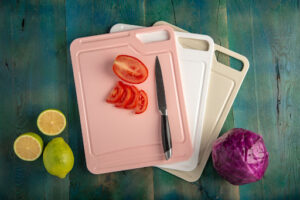These 7 Household Products May Be Linked to Cancer – Find Out Why

These 7 Household Products May Be Linked to Cancer – Find Out Why
This article will explore seven cancer-causing items that may be present in your home, including non-stick cookware and scented candles, and suggest safer alternatives to consider
Many individuals link the risk of cancer primarily to smoking, environmental pollution, or the consumption of processed foods. However, it is worth considering that some of the most significant dangers may be found within their own residences. Common household products—such as those used for cooking, food storage, and air freshening—can harbor toxic chemicals that potentially elevate cancer risk over time.
This article will explore seven cancer-causing items that may be present in your home, including non-stick cookware and scented candles, and suggest safer alternatives to consider. It may not be feasible to entirely eradicate exposure to toxins in numerous situations; however, individuals can protect their health by consciously avoiding them and making informed decisions.
Aluminium foil
Aluminium foil is commonly used by individuals for wrapping food or baking, often without awareness of the potential for aluminium to leach into food, especially when it comes to acidic or hot dishes. Prolonged exposure to high levels of aluminium has been linked to neurological issues and possible associations with breast cancer. It is advisable to consider alternatives such as parchment paper or banana leaves for food wrapping. Additionally, opting for glass or ceramic baking dishes can be a healthier choice compared to using foil-lined trays.
Refined oils
Refined oils, particularly vegetable oils rich in omega-6 fatty acids, are subjected to high-temperature processing that creates detrimental trans fats and free radicals. These compounds can elevate inflammation levels in the body, which is associated with the onset of certain cancers, notably colorectal and breast cancer. Choose cold-pressed oils such as olive oil, coconut oil, or mustard oil instead. Additionally, steer clear of deep-frying and avoid reheating oils multiple times.
Plastic Cutting Boards
Plastic cutting boards deteriorate with use, resulting in small plastic fragments contaminating food. These microplastics, along with toxic substances present in the plastic, can interfere with hormonal regulation in the body and have been associated with several types of cancer. Switch to wooden or bamboo chopping boards.
Scented candles
Scented candles may emit substances such as benzene and toluene, which are recognized as potential carcinogens. Furthermore, the paraffin wax often found in these candles can release harmful fumes during combustion, potentially elevating the risk of respiratory issues and lung cancers. To mitigate these risks, consider using natural alternatives like beeswax or soy candles. Additionally, essential oil diffusers can offer a delightful aroma without the associated toxins.
Plastic water bottles
Plastic water bottles frequently contain bisphenol A (BPA) and phthalates, substances recognized for their potential to disrupt hormonal balance. These harmful chemicals can seep into the water, particularly when bottles are subjected to high temperatures, such as being left in a vehicle. Research has associated BPA exposure with an increased risk of breast and prostate cancer. It is advisable to opt for glass or stainless steel water bottles.
Non-stick utensils
Non-stick utensils, such as Teflon-coated pans, can emit harmful chemicals when subjected to high temperatures. Compounds like perfluorooctanoic acid (PFOA) found in non-stick coatings have been associated with several health concerns, including cancer. Research indicates that long-term exposure may elevate the risk of kidney and testicular cancer. It is advisable to opt for cookware made from stainless steel, cast iron, or ceramic.
Plastic food storage containers
Plastic food storage containers, such as Tupperware, frequently contain substances like BPA, phthalates, and dioxins, which can leach into food when subjected to microwave heating. Certain health organizations classify some of these chemicals as potential carcinogens. It is advisable to use glass, stainless steel, or silicone containers for food storage. Avoid heating food in plastic containers, regardless of any “microwave-safe” labeling.












